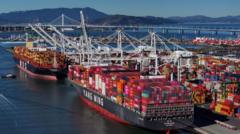As President Trump prepares to unveil his controversial tariffs, the fallout from his aggressive trade policies intensifies, leading to tensions with historical partners like Germany and Canada.
Trump's Tariff Plans Spark Worry Over Alliances

Trump's Tariff Plans Spark Worry Over Alliances
President Trump's upcoming "Liberation Day" tariffs raise concerns about deteriorating relations with key allies.
The arrival of the new German chancellor signals a shift in attitudes towards the U.S., with plans to pursue greater “independence.” Similarly, the Canadian prime minister has declared an end to the longstanding military and economic partnership, indicating a growing rift. In Poland, discussions about acquiring nuclear weapons have surfaced, illustrating rising anxieties. Greenland's prime minister has also expressed discontent, asserting that the territory will not be claimed by the U.S., despite Trump's previous comments about its acquisition.
These developments are largely a response to Trump’s threats aimed at NATO allies and critical comments about the European Union. On the brink of announcing the "Liberation Day" tariffs, uncertainty looms over their specific targets and implications for global markets.
The tariffs are expected to impact both adversarial nations, such as China, and traditional allies, raising concerns about retaliatory measures that could hurt American farmers and businesses. So far, the administration has not provided clarity on the economic repercussions of the tariffs, leaving many policymakers worried about the potential effects on U.S. alliances and the broader global economy. As Trump’s administration grapples with these complex issues, the potential fallout from the tariffs remains to be seen.





















